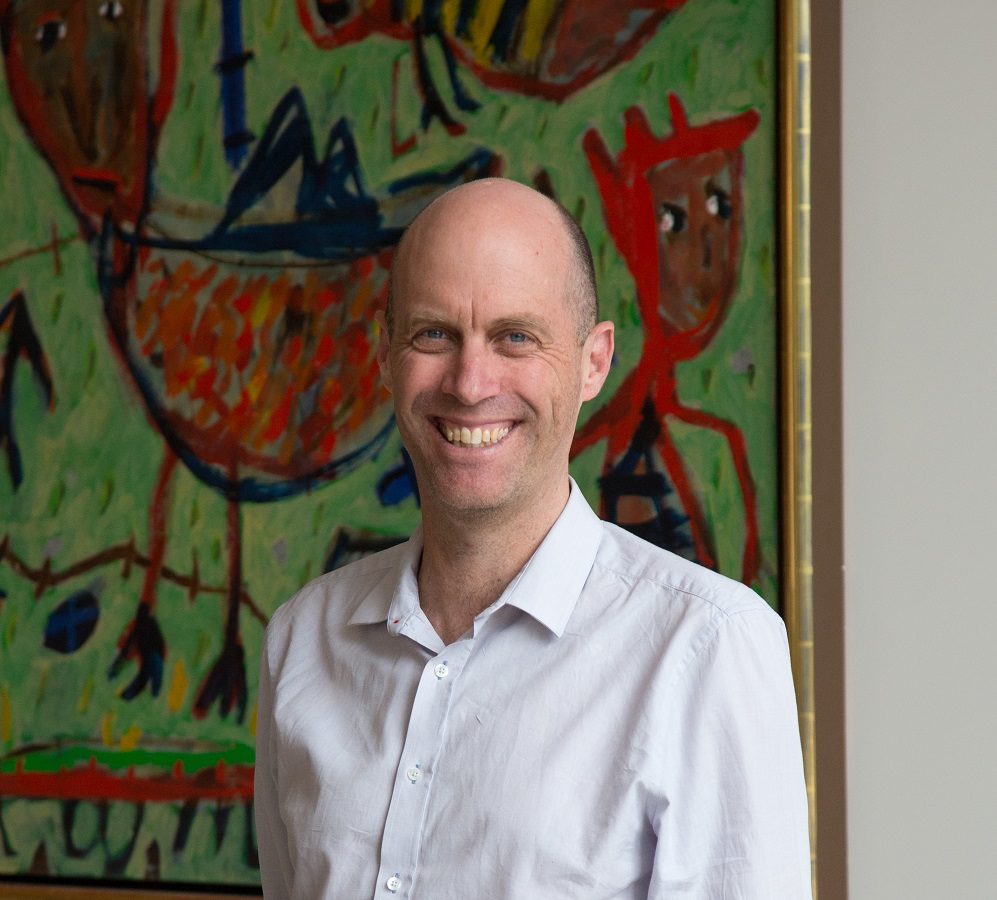
By David Sly
As the spread of COVID-19 fuelled apprehension and uncertainty through our community, immunisation expert Associate Professor Nigel Crawford – who completed his medical undergraduate studies at Flinders University in 1996 – brought much-needed clarity to public understanding and acceptance of vaccination.
Associate Professor Crawford was well placed to provide both medical and policy insights. He is the Director of Melbourne Vaccine Education Centre (MVEC) and Surveillance of Adverse Events Following Vaccination in the Community (SAEFVIC), based at the Murdoch Children’s Research Institute in Melbourne. SAEFVIC is a Victorian vaccine safety service and immunisation research group.
When the pandemic took hold in 2020, Associate Professor Crawford was seconded from the Royal Children’s Hospital in Melbourne, where he works as a general paediatrician, to the Victorian Department of Health, to focus on vaccine safety and policy as Australia prepared for the COVID-19 vaccine rollout.
His work helped steer Australia’s successful uptake of COVID-19 vaccines, and especially to help prepare correct vaccine doses for children. “They are not just small adults, they respond to the disease and the vaccines differently,” he explains. “We had to understand why it appears that children seem to be less severely affected by COVID-19 and understand the dynamic of how it gets transmitted within families. Our research into all this is ongoing.”
As current chair of the Australian Technical Advisory Group for Immunisation (ATAGI), the peak vaccine advisory body for the Department of Health in Canberra, Associate Professor Crawford also provides vital expertise in vaccinating special risk groups (such as immunosuppressed patients) and the clinical evaluation of adverse events following immunisation.
“Flexibility has been a key to the success of Australia’s vaccine uptake,” says Associate Professor Crawford. “Just when we think we know where things are heading, the virus keeps shifting. We can never feel truly settled – and the arrival of the Omicron variant showed us this – but we have been able to react and adapt with our vaccine advice.”
“Flexibility has been a key to the success of Australia’s vaccine uptake,” says Associate Professor Crawford. “Just when we think we know where things are heading, the virus keeps shifting. We can never feel truly settled – and the arrival of the Omicron variant showed us this – but we have been able to react and adapt with our vaccine advice.”
He believes successful public discussion about effective immunisation has come through the clarity of communication from health officials to both patients and the general public. Associate Professor Crawford says ATAGI and health authorities were able to combat misinformation being spread through social media channels by using scientific data that shows the mechanism of how the immunisation process works, and scientific literature regarding vaccine safety.
“We understand that the pandemic has been very stressful for the whole population, but we’ve had to encourage people to ask more questions of their doctors and health professionals, rather than proceed down the rabbit hole to follow claims about vaccines being made on some websites. This meant that we had to discuss the safety signals, had open discussions about the occurrence of adverse effects, and provided the necessary help and support for anyone who had such reactions. We need to keep reminding the public that the response to these safety concerns has been proactive.”
Fundamental to the effectiveness of vaccine education has been to clearly state the primary aim of COVID-19 immunisation, which is to provide adequate protection against severe disease, preventing people from being hospitalised and ending up in intensive care units or dying.
Whilst his secondment at the Victorian Department of Health has come to an end, Associate Professor Crawford returned in February 2022 to clinical work at the Royal Children’s Hospital and SAEFVIC.
He remains committed to promoting immunisation and hopes that the population doesn’t succumb to vaccine fatigue. “We can have COVID-19 and flu vaccines together, so therefore continued protection through a robust ongoing immunisation program and booster shots (when recommended) is vital.”
He believes that sustained vaccination awareness is a critical part of paediatric medicine – with more than 95% of Australian children receiving immunisation before their first birthday – and reminds us that without vaccines we would still see widespread outbreaks of such diseases as measles and whooping cough. “I’m keen that we can normalise an ongoing vaccine schedule. We don’t want the current lessons learnt during the pandemic about the value of vaccination vigilance to be lost.”

